|
|
|
Sort Order |
|
|
|
Items / Page
|
|
|
|
|
|
|
| Srl | Item |
| 1 |
ID:
090189
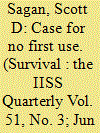

|
|
|
|
|
| Publication |
2009.
|
| Summary/Abstract |
In his 5 April 2009 speech in Prague, US President Barack Obama promised that 'to put an end to Cold War thinking, we will reduce the role of nuclear weapons in our national security strategy and urge others to do the same'. The forthcoming Nuclear Posture Review (NPR), mandated by Congress, provides the administration an opportunity to honour that commitment. To reduce the role of nuclear weapons in national security strategy, however, the next NPR must abandon the long-standing US policy of threatening to use its nuclear weapons first in a variety of military scenarios. This basic step was not taken in the George W. Bush administration's 2001 NPR, despite its claim to institute 'a major change in our approach to the role of nuclear offensive forces in our deterrent strategy' and call to 'both reduce our dependence on nuclear weapons and improve our ability to deter attack in the face of proliferating [weapons of mass destruction (WMD)] capabilities'. Indeed, the 2001 NPR contradicted these stated ambitions by maintaining that nuclear weapons were still necessary to 'provide credible military options to deter a wide range of threats, including WMD and large-scale conventional military force'.
|
|
|
|
|
|
|
|
|
|
|
|
|
|
|
|
| 2 |
ID:
090183
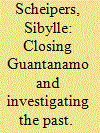

|
|
|
|
|
| Publication |
20009.
|
| Summary/Abstract |
Closing Guantanamo confronts the United States and the West more generally with two different but interrelated tasks. The first is facing up to the past detention policy: how could it happen that the prohibition against torture, which both academics and policymakers regarded as a strong and consolidated norm in international relations, yielded under the weight of the shock and fear caused by the events of 11 September 2001.
|
|
|
|
|
|
|
|
|
|
|
|
|
|
|
|
| 3 |
ID:
090182
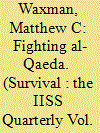

|
|
|
|
|
| Publication |
2009.
|
| Summary/Abstract |
Among President Barack Obama's first acts was to announce the closure of the detention facility at Guantanamo Bay and strict limits on the Central Intelligence Agency's interrogation authority. These announcements were greeted in the United States and Europe alike with euphoria among critics of the George W. Bush administration, who saw them as signalling an end of the entire global war on terror paradigm.
|
|
|
|
|
|
|
|
|
|
|
|
|
|
|
|
| 4 |
ID:
090170
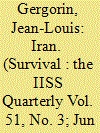

|
|
|
|
|
| Publication |
2009.
|
| Summary/Abstract |
In April 2009 the five permanent members of the UN Security Council plus Germany (the P5+1) proposed to restart negotiations with Tehran without first requiring a freeze on Iranian uranium-enrichment activities. Iranian President Mahmoud Ahmadinejad answered positively while extolling the claimed successes of the Iranian nuclear programme: completion of a fuel-pellet fabrication plant, 7,000 operational centrifuges in Natanz, and the testing of two new types of centrifuge. Meanwhile, Israeli officials and pundits continue to suggest that Israel will attack Iranian nuclear sites should the Natanz expansion continue.
|
|
|
|
|
|
|
|
|
|
|
|
|
|
|
|
| 5 |
ID:
090186


|
|
|
|
|
| Publication |
2009.
|
| Summary/Abstract |
Since 1996, Russia and China have been united in what both call a 'strategic partnership'. There is a good deal of presentism - the infinite extrapolation of now - in Western analyses of the relationship. But as English historian A.J.P Taylor said of the lessons of history, the only visible pattern to the relationship between Moscow and Beijing over the past six decades is that there is no pattern. The current stage will more than likely give way to another that could surprise us, as previous ones have. The direction of such shifts has generally defied expectations. The explanations - China's dependency on Russia, ideological bonds, animosities rooted in history and race - adduced to predict the course of Russia-China relations repeatedly proved invalid. The relationship was never as solid as it seemed, nor as dangerous. The policies of third countries did influence its course at times, but the prime movers were the principals themselves.
|
|
|
|
|
|
|
|
|
|
|
|
|
|
|
|
| 6 |
ID:
090184
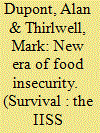

|
|
|
|
|
| Publication |
2009.
|
| Summary/Abstract |
With the world in the midst of the most serious economic downturn since the Great Depression and soft commodity prices depressed, it is easy to forget that barely a year ago sky-rocketing food prices were generating serious political and social strife in more than 30 countries around the world. The price of rice more than tripled in the 12 months to April 2008, while the food price index published by the Food and Agriculture Organisation (FAO) rose by an unprecedented 50%. In 2007, the number of people living in conditions of food insecurity increased by between 50 and 130 million as the global food import bill rose to its highest level on record. Pessimists predicted the end of cheap food presaging a new era of resource insecurity. The spectre of Malthus seemed once again to haunt the Earth. Were these dramatic increases in price merely a cyclical aberration or do they foreshadow a structural shift in supply and demand that will prove the pessimists right? These are not inconsequential questions. The price of food is a matter of profound importance for the economic well-being of billions of people and the political stability of the most affected states. This analysis explores the reasons for the 2008 food crisis by placing it in historical context and drawing out the implications for policymakers and business.
|
|
|
|
|
|
|
|
|
|
|
|
|
|
|
|
| 7 |
ID:
090187
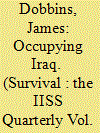

|
|
|
|
|
| Publication |
2009.
|
| Summary/Abstract |
L. Paul Bremer arrived in Baghdad on 12 May 2003 with a broad mandate and plenary powers. As administrator of the Coalition Provisional Authority (CPA), he was charged with governing Iraq and promoting the development of a functioning democracy that, it was hoped, would serve as a model for the entire Middle East. Bremer could dispose of all Iraqi state assets and direct all Iraqi government officials. He possessed full executive, legislative and judicial authority. His instructions from Washington were quite general, and for the most part oral. Over the next several months he received plentiful advice but little further direction.
|
|
|
|
|
|
|
|
|
|
|
|
|
|
|
|
| 8 |
ID:
090168
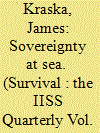

|
|
|
|
|
| Publication |
2009.
|
| Summary/Abstract |
In March 2009 the Chinese conducted bold and dangerous manoeuvres against the USNS Impeccable, a US Navy military survey vessel operating about 120 kilometres from the island of Hainan in the South China Sea. Five Chinese government vessels, including a Navy intelligence-collection ship, a Bureau of Maritime Fisheries patrol vessel, a State Oceanographic Administration patrol vessel, and two small Chinese-flagged trawlers, surrounded and blocked the transit of the US vessel in international waters. In an odd turn, a Chinese vessel approached within 8 metres of the American ship in an attempt to cut its towed array; when the Impeccable engaged the Chinese vessel with fire hoses to repel it, the Chinese crew stripped to their underwear. The event marks the first test of the Obama administration regarding China's efforts to reshape the legal regime that applies to the littoral zone under the 1982 Law of the Sea Convention. Beijing provoked a similar crisis early in 2001 at the start of President George W. Bush's first term, when a Chinese interception of an American EP-3 surveillance aircraft flying in international airspace over the East China Sea caused a mid-air collision and the loss of the Chinese fighter jet and pilot, and required an emergency landing of the US aircraft on Hainan. 'Innocent passage by naval vessels from other countries in the territorial waters in the special economic zone is acceptable, but not allowed otherwise', a senior spokesman in Beijing stated after the March 2009 incident.
|
|
|
|
|
|
|
|
|
|
|
|
|
|
|
|
| 9 |
ID:
090171


|
|
|
|
|
| Publication |
2009.
|
| Summary/Abstract |
Armed with nuclear weapons, home to al-Qaeda, and heavily infested with a growing mass of domestic radical Islamists, Pakistan has been famously called the 'most dangerous place on earth'. At the root of the country's problems is a feudal political establishment primarily interested in promoting and preserving its own narrow class interests and unable or unwilling to seriously address the myriad threats the country faces. Unless and until this dynamic changes, Pakistan cannot be counted on to help the United States in its struggle against the Taliban or even to stop the spread of radical Islam within its own borders. Unfortunately, there is nothing in the nature of Pakistani political culture, nor in the performance of the Pakistani political class since the founding of the state, that provides any grounds for optimism.
|
|
|
|
|
|
|
|
|
|
|
|
|
|
|
|
| 10 |
ID:
090167
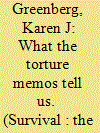

|
|
|
|
|
| Publication |
2009.
|
| Summary/Abstract |
On 16 April 2009, US President Barack Obama, responding to an American Civil Liberties Union (ACLU) Freedom of Information Act request, released four Bush-era documents belonging to a series of papers known collectively as the 'torture memos', which outline the US government's legal analysis and policy decisions for interrogating terrorism suspects in the wake of the 11 September 2001 attacks. In the years since the release of the Abu Ghraib photographs and the subsequent reports into detention and interrogation policies in the 'war on terror', the public has been made generally aware of the content of these papers. Beginning in summer 2004, we have been able to read many of the major documents, including the infamous memo of 1 August 2002 that redefines torture; the Alberto Gonzales memo of 25 January 2002 that called the Geneva Conventions 'quaint and obsolete'; and Donald Rumsfeld's letter signing off on the enhanced interrogation techniques that would create a law-free zone at Guantanamo Bayfor six weeks from early December 2002 until January 2003. All of these have been subjected time and again to the scrutiny of scholars and experts such as Philippe Sands, Mark Danner and others, as well as to the attention of congressional oversight committees.
|
|
|
|
|
|
|
|
|
|
|
|
|
|
|
|
|
|
|
|
|